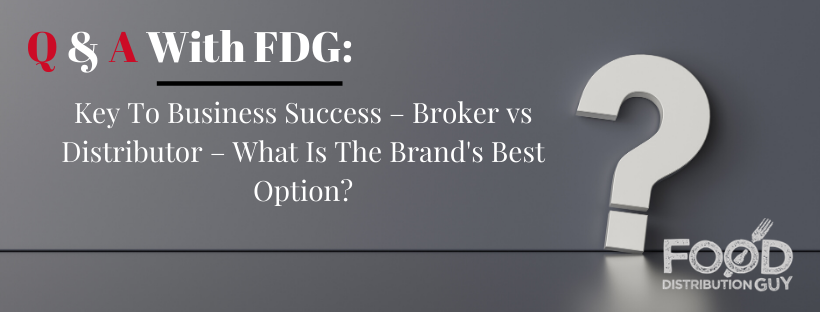
Q & A With FDG: Key To Business Success – Broker vs Distributor – What Is The Brand’s Best Option?
The Canadian grocery sector is an extremely competitive sector in which food brands on a global basis engage in battle to secure a front-row seat on a retailer’s shelf. With so much competition, and limited shelf space, who comes out on top may come down to what sales practice does your brand employ – Broker vs. Distributor. In my dealings. I am astonished to hear
- What is the difference between a broker and distributor?
or
- Why do I require them? I can do it on my own.

BROKER VS DISTRIBUTOR – WHAT IS THE BRAND’S BEST OPTION?
Do these questions I posed sound familiar? Yes? Let’s dwell further into this subject matter. Make no mistake about it, both a broker and a distributor play a key role in a brand’s success at retail.
A food broker is an independent sales agent that works in negotiating sales for food manufacturers. They work for both manufacturers and food buyers as they assist in selling food products to the retail grocery channel. In many cases, they also help keep manufacturers up-to-date on local market conditions.
A food distributor functions as an intermediary between food manufacturers and the retail operators. The distributor purchases, stores, sells, and delivers those products, providing retailers with access to food products from a wide variety of manufacturers.
Two main differences between the broker and distributor:
- The distributor takes ownership of the manufacturers’ product, the broker will not.
- Brokers will not work with a competing brand. Distributors may offer products from brands that compete in the same category.
The main reason why manufacturers employ the services of a food broker is it saves them money from starting their own sales force. They have connections with retailers’ buyers and it is much easier for retailers to deal with one food broker than it is to deal with representatives from every manufacturer. Additional benefits to working with a food broker:
- Brokers allow manufacturers to focus on other aspects of the business.
- Brokers do more than sell. They keep their principles up-dated on the status of their retail listings and will work behind the scenes to keep your product listed if it is on the chopping block.
- They provide the attention to detail your brand deserves and requires.
The distributor like the broker plays a vital role in a brand’s success. Due to the number of retail locations a banner operates may prohibit them from dealing directly with the food manufacturer. Assuming the manufacturer’s minimum order is one pallet per sku many do not have the capacity or desire to carry that inventory in their warehouse. Additional benefits to working with a distributor:
- Established customer base. They deliver direct to the store.
- Storage and logistics.
- Quick route to market.
The Pareto principle (also known as the 80/20 rule) states that, for many events, roughly 80% of the effects come from 20% of the causes. For the distributor, 80% of their sales comes from 20% of the brands they represent. For new entrants, how do they keep the distributor focused on their brand until the day it enters the distributors top 20 echelon of the brands they represent?
When calculating your products suggested retail selling price, keep in mind the costs of doing business with the broker and distributor. The broker works off of commission. The standard rate is between 5% to 7%. In addition, they may request a retainer against the commission. When the distributor establishes their selling price to the retailer, their standard mark up is between 25% – 30%, not including the retailer’s co-op program.
Food manufacturers who try and deal with retailers on their own do so at their own discretion. Cold calling and expecting a call back from a grocery buyer to whom the brand has no relationship with is equivalent to the odds of winning the lottery – slim to none. They are too busy to return calls to manufacturers they are not presently dealing with. As is the case to avoid the distributor. To think it is feasible to ship your brand’s order to each individual store and continue to make a profit is just a fantasy that will not come true. The best route to market comes down to cost and what sales direction is best suited for the manufacturer. When approaching a broker or distributor come prepared to discuss:
- What makes your brand unique?
- What do you bring to the category?
- How do you intend to support the brand’s launch internally and externally?
- What accounts are you doing business with that you can transfer over?
Richard Baker is the founder and President of Food Distribution Guy. Seek assistance securing a broker/distributor, forward us an email: richard@fooddistributionguy.com. Or contact us here – we’re here to help your brand succeed!





